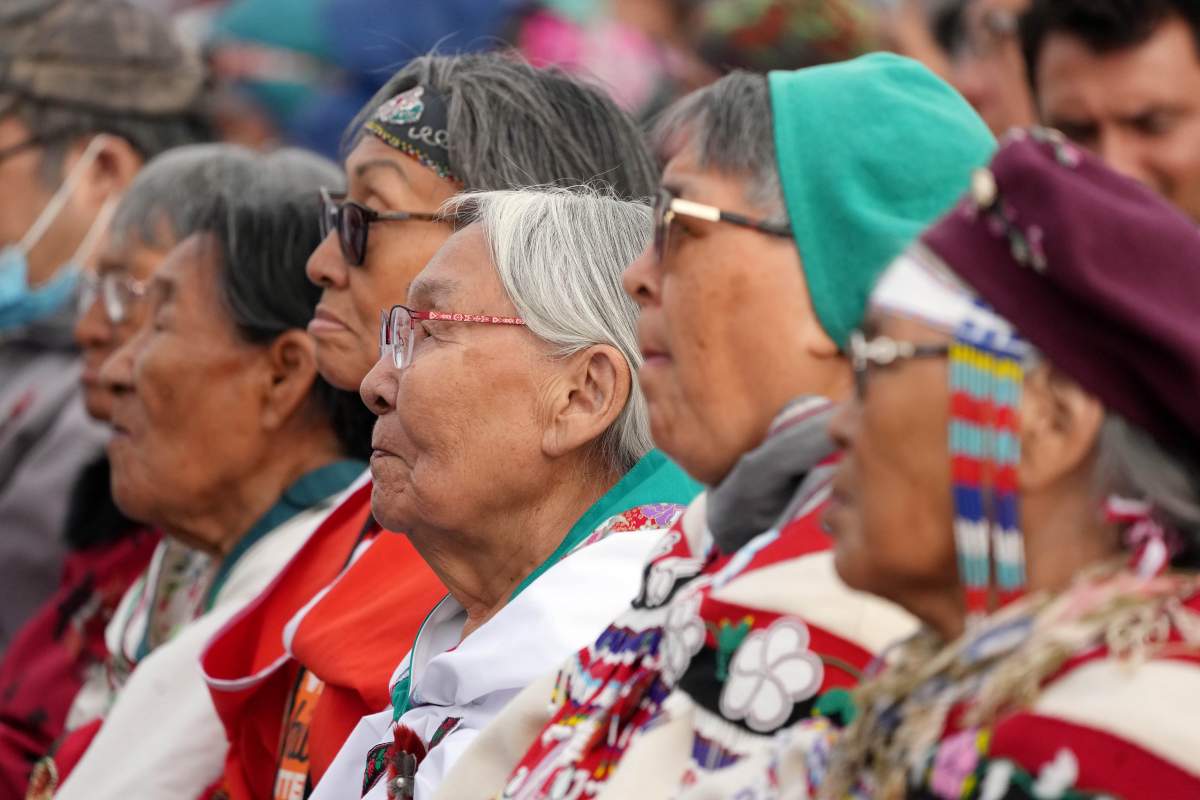IQALUIT, Nunavut — Pope Francis begged for forgiveness for the evil perpetrated by “not a few” Catholics as he wrapped up Friday a six-day visit that saw celebration and criticism for his repeated apologies for the Catholic Church’s role in cultural assimilation and residential schools.

“How evil it is to break the bonds uniting parents and children, to damage our closest relationships, to harm and scandalize the little ones,” Francis said in Spanish, which was translated to Inuktitut and English, during his final public address in Iqaluit.
The brief stop in Nunavut’s capital marked the first time a pope has travelled to the territory. Francis met privately with Inuit residential school survivors and their families at the Nakasuk Elementary School before taking part in a public cultural event.
“We are here with the desire to pursue together a journey of healing and reconciliation that, with the help of the Creator, can help us shed light on what happened and move beyond that dark past,” Francis said.

Get breaking National news
READ MORE: Pope Francis says genocide happened at residential schools: ‘I did condemn this’
The apology mirrored others the pontiff gave during stops in Alberta and Quebec.
Francis had described the historic journey as “penitential,” saying the aim was reconciliation with Indigenous people. Many applauded both the Pope’s presence and apologies, but others found his words and efforts lacking.
Arnrak Korgak, a day school survivor, said he had hoped Francis would go further in his apology and acknowledge the church, as an institution, played a role. But he said there was still healing in the Pope’s words.
“It’s hard for people, especially for the survivors who experience pain and abuse,” he said. “And that had to be recognized, so that it never happens again.”
Traditional dancers, drummers and throat singers performed in front of Francis. The pontiff smiled and clapped after a performance by Inuk soprano Deantha Edmunds.
READ MORE: Pope Francis wraps Canadian reconciliation visit by apologizing in Inuktitut: ‘Mamianaq’
Mary-Lee Aliyak said residential schools attempted to take away Inuit culture and language. So it was important to showcase song and dance for Francis.
“Today is history,” she said. “It’s making a history that we are acknowledged as people, as the First Peoples of Canada.”
A person held up a sign calling for the Doctrine of Discovery, a decree from the Vatican that was used to justify colonization, to be rescinded. It was a message seen at nearly every stop on the Pope’s tour.
Piita Irniq also performed a traditional drum dance and presented the instrument to Francis as a gift at the end. The Inuit elder has tried for decades to have Johannes Rivoire, an Oblate priest accused of sexual abuse against Inuit children, returned to Canada to face charges. An Inuit delegation to Rome earlier this year also requested the Pope personally intervene in the case.
The federal government said this week that Canada has asked France to extradite Rivoire, who is wanted on a Canada-wide warrant.
On Thursday, Francis denounced the “evil” of sexual abuse for the first time on the trip while at a prayer service in Quebec City.
READ MORE: Pope Francis condemns ‘oppressive’ policies against Indigenous in Canada
He also had a private meeting with Indigenous leaders and survivors in Quebec City earlier Friday. Ghislain Picard, head of the Assembly of First Nations Quebec-Labrador, said it will be up to each person to decide if the Pope’s trip met their expectations.
He said survivors have “had their moment.”
“It’s really up to them to take the measure of all this, whether it’s going to provide that kind of way for their healing,” Picard said. “It’s going to take time.”
The delegation included survivors and representatives of First Nations across Eastern Canada, some of whom could be seen presenting the Pope with gifts.
Cree Grand Chief Mandy Gull-Masty said the meeting was marked by some confusion as supporters of some residential school survivors were asked to leave the room by the archbishop’s staff even after papal security had let them in.
She said survivors used the meeting to share their pain and stories. One from her community in northern Quebec forgave the church for trespassing against the community, she said, while one nation insisted on how its ways, culture and language must be acknowledged and respected by the church.
Chief Duke Peltier of the Wiikwemkoong First Nation in northern Ontario said after the meeting that he had expected “a little more sincerity and more of an acceptance of responsibility for the church’s participation in the assimilative efforts of our people.”
In his address in Quebec City, Francis said he had been enriched by stories of the Indigenous people he has met in Canada.
“I can truly say that, while I came to be with you, it was your life and experiences, the Indigenous realities of these lands, that have touched me, remained with me, and will always be a part of me.”




















Comments